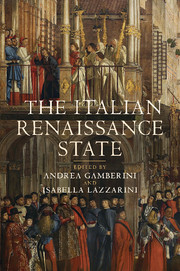Book contents
- Frontmatter
- Contents
- Notes on the contributors
- Note on translations and usage
- Map
- Introduction
- Part I The Italian states
- Part II Themes and perspectives
- 12 The collapse of city-states and the role of urban centres in the new political geography of Renaissance Italy
- 13 The rural communities
- 14 Lordships, fiefs and ‘small states’
- 15 Factions and parties: problems and perspectives
- 16 States, orders and social distinction
- 17 Women and the state
- 18 Offices and officials
- 19 Public written records
- 20 The language of politics and the process of state-building: approaches and interpretations
- 21 Renaissance diplomacy
- 22 Regional states and economic development
- 23 The papacy and the Italian states
- 24 Justice
- Bibliography
- Index
16 - States, orders and social distinction
Published online by Cambridge University Press: 05 August 2012
- Frontmatter
- Contents
- Notes on the contributors
- Note on translations and usage
- Map
- Introduction
- Part I The Italian states
- Part II Themes and perspectives
- 12 The collapse of city-states and the role of urban centres in the new political geography of Renaissance Italy
- 13 The rural communities
- 14 Lordships, fiefs and ‘small states’
- 15 Factions and parties: problems and perspectives
- 16 States, orders and social distinction
- 17 Women and the state
- 18 Offices and officials
- 19 Public written records
- 20 The language of politics and the process of state-building: approaches and interpretations
- 21 Renaissance diplomacy
- 22 Regional states and economic development
- 23 The papacy and the Italian states
- 24 Justice
- Bibliography
- Index
Summary
Introduction
Early in the sixteenth century Niccolò Machiavelli, in a famous chapter (I, 55) of the Discorsi sopra la prima deca di Tito Livio, set out one of the fundamental criteria marking the difference between republics and kingdoms. He thereby created a long-lived image of the diverse Italies as unitary and coherent. According to this criterion, monarchies are such because they need the presence of nobility, while on the contrary republics exist on the principle of the ‘equality’ of the citizenry. Where there is a republic there must be no gentlemen, and wherever there is a king there must be lords. The geometrical simplicity of this scheme appears in a different light if compared with at least two other passages from the Discorsi: one (I, 6) notes that in Venice – by then considered the perfect model of a republic – not all of the citizens participated in governing the city and that the gentlemen were exactly those who were ‘allowed to take part in administration’; the second (I, 16) states that in every type of republic it was a small minority that in reality governed and that for the majority it was ‘enough to live safely’. Seen this way, the dichotomy kingdom–republic is heuristic and normative rather than descriptive of the complicated mosaic in the peninsula. It corresponds to a substantial symmetry: maintaining the ‘orders’ would require the social configuration to be congruent with the type of constitution; but the ‘equality’ of the republic is not and cannot mean equality inside the community, just as the presence of nobility may not be considered a prerogative of kingdoms.
Machiavelli opens a valuable perspective on how mature the processes of constructing social hierarchies were in the Italian states at the end of the Middle Ages: while offering the basis of an image for the political geography of an earlier Italy which had become part of the common perception – the three-part image of republics, principalities and kingdoms – he suggests a way of questioning it. Indeed, recent historiography seems to follow this path, suggesting a minimal criterion of orientation: the most classical pictures of political geography do not precisely correspond to real societal forms. In order to find our way through this labyrinth we must break down the bi- or tripartite political spaces and adopt a different perspective to seek out the resulting social spaces.
- Type
- Chapter
- Information
- The Italian Renaissance State , pp. 323 - 344Publisher: Cambridge University PressPrint publication year: 2012
- 2
- Cited by



